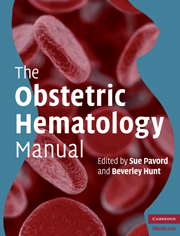Crossref Citations
This Book has been
cited by the following publications. This list is generated based on data provided by Crossref.
Wadhwa Desai, Rahat
and
Smith, Mary Alice
2017.
Pregnancy‐related listeriosis.
Birth Defects Research,
Vol. 109,
Issue. 5,
p.
324.
Piercy, Catherine Nelson
2017.
Handbook of Venous Thromboembolism.
p.
129.
Webster, Amy
and
Pavord, Sue
2017.
Practical Hemostasis and Thrombosis.
p.
379.
Bakrim, Saad
Motiaa, Youssef
Ouarour, Ali
and
Masrar, Azlarab
2018.
Hematological parameters of the blood count in a healthy population of pregnant women in the Northwest of Morocco (Tetouan-M'diq-Fnideq provinces).
Pan African Medical Journal,
Vol. 29,
Issue. ,
Gebreweld, Angesom
Bekele, Delayehu
and
Tsegaye, Aster
2018.
Hematological profile of pregnant women at St. Paul’s Hospital Millennium Medical College, Addis Ababa, Ethiopia.
BMC Hematology,
Vol. 18,
Issue. 1,
Pavord, Sue
and
Oppenheimer, Christina
2020.
Reflections on the development of Obstetric Haematology as a new discipline in the UK.
British Journal of Haematology,
Vol. 191,
Issue. 4,
p.
604.
Khalid, Azriny S
Hadbavna, Adriana
Williams, David
and
Byrne, Bridgette
2020.
A review of stroke in pregnancy: incidence, investigations and management.
The Obstetrician & Gynaecologist,
Vol. 22,
Issue. 1,
p.
21.
Давыдова, Ю.В.
Нетяженко, В.З.
Наумчик, А.Н.
Козачишин, Н.И.
and
Лиманская, А.Ю.
2021.
Анализ тромбоцитарного звена гемостаза у беременных с иммунной тромбоцитопенией.
Reproductive Medicine,
p.
59.
Kumar, Utpal
Gupta, Arvind Kumar
Singh, Neha
Chandra, Harish
and
Chowdhury, Nilotpal
2022.
Reference intervals for reticulocyte parameters (reticulocyte haemoglobin equivalent and immature reticulocyte fraction) in first-trimester pregnancy.
Journal of Obstetrics and Gynaecology,
Vol. 42,
Issue. 5,
p.
1401.
Stanciakova, Lucia
Dobrotova, Miroslava
Holly, Pavol
Zolkova, Jana
Vadelova, Lubica
Skornova, Ingrid
Ivankova, Jela
Samos, Matej
Bolek, Tomas
Grendar, Marian
Danko, Jan
Kubisz, Peter
and
Stasko, Jan
2022.
How can Secondary Thromboprophylaxis in High-Risk Pregnant Patients be Improved?.
Clinical and Applied Thrombosis/Hemostasis,
Vol. 28,
Issue. ,
p.
107602962110700.
Levent Cirakli, Zeynep
and
Gulec, Nuray
2022.
Evaluation of White Blood-cell-based Inflammatory Markers in Gestational Diabetes Mellitus.
Bakirkoy Tip Dergisi / Medical Journal of Bakirkoy,
Vol. 18,
Issue. 2,
p.
157.





